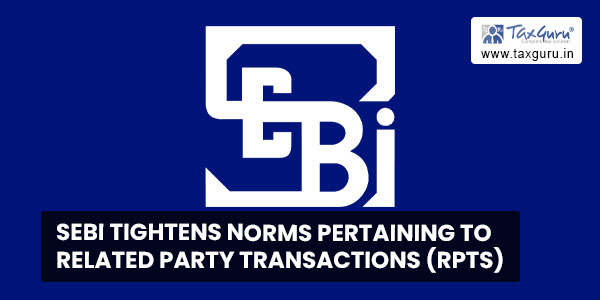SEBI has recently amended the existing provisions pertaining to ‘Related Party’ and ‘Related Party Transactions’ vide notification of the Securities and Exchange Board of India (Listing Obligations and Disclosure Requirements) (Sixth Amendment) Regulations, 2021 on 9th November, 2021 to strengthen the monitoring of Related Party Transactions and for better governance. Certain amendments shall come into force from 1st April, 2022 and remaining from 1st April, 2023.

Highlights of the aforesaid amendments are as follows:
| Particulars | Existing Provisions | Amended provisions | Date of applicability of amended provisions | Remarks |
| Deemed Related Party (RP) |
Any person or entity belonging to the promoter or promoter group of a listed entity and holding 20% or more of shareholding in such listed entity shall be deemed to be a related party. |
All persons or entity forming part of the promoter or promoter group, irrespective of its shareholding in the listed entity shall be deemed to be a related party. |
01.04.2022 |
A promoter may exercise control over a company and influence company decisions irrespective of the extent of shareholding and hence this change was necessary to plug any gaps. Accordingly, the definition of Related Parties has been widened. |
|
Any person or entity holding, either directly or on a beneficial interest basis, 20% or more of the equity shareholding in the listed entity shall be deemed to be a related party. |
01.04.2022 | |||
|
Any person or entity holding, either directly or on a beneficial interest basis, 10% or more of the equity shareholding in the listed entity shall be deemed to be a related party. |
01.04.2023 | |||
| Related Party Transaction (RPT) |
RPT means transaction between a listed entity and a related party of the listed entity. |
RPT means transaction between: a. Listed entity and a related party of the listed entity; b. Listed entity and a related party of the subsidiary of the listed entity; c. Subsidiary of the Listed entity and a related party of the listed entity; d. Subsidiary of the Listed entity and a related party of the subsidiary of the listed entity; |
01.04.2022 |
Definition of Related Party Transactions have been widened for good governance across entities. The intent here seems to govern transactions with seemingly unrelated parties, however intended to benefit related parties and the like. Accordingly, listed entities will have to review and identify the list the related parties of all its subsidiaries and furnish the list of its related parties to all its subsidiaries in view of this amendment to identify RPTs. |
|
RPT also means transaction between a listed entity or its subsidiary with any other person or entity with the purpose and effect to benefit the listed entity or its subsidiary. |
01.04.2023 | |||
| Exclusions from the scope of RPTs | – |
Preferential issue of specified securities in compliance with SEBI (ICDR) Regulations; corporate actions by listed entity (dividend payment, sub-division or consolidation of securities, rights issue, bonus issue and buy-back of securities) involving related parties have been excluded from the scope of related party transactions. ♦ Further, acceptance of fixed deposits by banks/ NBFCs at the terms uniformly applicable/ offered to all shareholders, subject to disclosure of such acceptance, and disclosure of RPT in every 6 months to the Stock Exchange also excluded from the scope of RPTs. |
01.04.2022 | Ambiguities removed by insertion of these specific provisions. |
| Material RPTs |
Threshold for Material RPT being 10% of the annual consolidated turnover of the listed entity, either individually or taken together with the previous transactions during a financial year. |
Threshold for Material RPT being Rs. 1,000 crores or 10% of the annual consolidated turnover of the listed entity whichever is lower, either individually or taken together with the previous transactions during a financial year. |
01.04.2022 |
Threshold revised for determination of Material RPT, thus partially adopting the working group’s recommen-dations, to expand the scope of shareholders’ approval. |
|
Prior approval of the Audit Committee |
All related party transactions require prior approval of the audit committee. |
All related party transactions and subsequent material modifications shall require prior approval of the audit committee of listed entity. |
01.04.2022 |
Since the amended definition covers wider transactions, the working group had recommended narrowing the audit committee approvals in certain cases. |
|
Audit committee to define such material modifications and disclose it as a part of policy on materiality of RPT. |
01.04.2022 | |||
|
♦ RPTs by subsidiary of a listing entity where the listed entity is not a party (i.e. transaction is undertaken by subsidiary with a related party other than a listed entity itself) will require prior approval of the Audit Committee of the parent listed entity where the transaction value exceeds specified thresholds as follows: |
||||
|
♦ 10% of the consolidated turnover of the listed entity, or |
01.04.2022 | |||
|
♦ 10% of annual standalone turnover of the subsidiary. |
01.04.2023 | |||
| ♦ Audit Committee approval shall not be required for transaction(s) entered into between the listed subsidiary and a related party, provided provisions of Regulation 23 and 15(2) are applicable on the listed subsidiary. | ||||
|
Shareholders’ approval for Material RPTs |
All materials RPTs will require approval of shareholders of the listed entity. |
All materials RPTs and subsequent material modifications basis threshold as defined by the Audit Committee, will require prior approval of shareholders of the listed entity. Where the transaction(s) is being entered into between a listed subsidiary and a related party (and not the listed entity itself) and provisions of Regulation 23 and 15(2) are applicable on the listed subsidiary, prior shareholders approval will not be required. |
01.04.2022 | Scope widened |
| Prior Approval not required | ♦ Prior approval of Audit Committee and shareholders approval for material RPT shall not be required for:
a. Transaction(s) between 2 government companies. b. Transaction(s) entered into between a holding company and its wholly owned subsidiary. |
♦ Prior approval of Audit Committee and shareholders approval for material RPT shall not be required for: a. Transaction(s) between 2 government companies. b. Transaction(s) entered into between holding company and its wholly owned subsidiary. c. Transaction(s) entered into between two wholly-owned subsidiaries of the listed holding company. |
01.04.2022 | |
| Enhanced Disclosure of RPTs and squeezing of timelines |
For Equity listed entities: Disclosure to be made within 30 days from the date of publication of its standalone and consolidated financial results, for the half year. |
For Equity listed entities: Disclosure to be made within 15 days from the date of publication of its standalone and consolidated financial results, for the half year. |
01.04.2022 | Stricter timeline |
|
Disclosure to be made simulta-neously along with publication of its standalone and consolidated financial results, for the half year. |
01.04.2023 | |||
| Listed entity shall make disclosures in compliance with the Accounting Standard on “Related Party Disclosures”. |
♦ Listed entity which has listed their non-convertible securities shall make disclosures in compliance with the Accounting Standard on “Related Party Disclosures”. |
01.04.2022 | ||
| – |
All listed entities except listed banks shall disclose details of loans and advances in the nature of loans to firms/ companies in which directors are interested by name and amount, by the listed entity and its subsidiaries, in their CG report forming part of annual report. |
01.04.2022 | Enhanced disclosure |
Conclusion: With these amendments coming into force, the RPT framework would have a better governance structure and many illegitimate transactions may get captured in the enlarged regulatory net which were till now outside the purview of the regulator. However, SEBI’s amendments may result in significant increase in the workload of the audit committee and overall compliance burden of the listed companies with increased compliance costs. However, considering recent practical examples, norms pertaining to RPTs required better control and governance to safeguard the interest of minority shareholders and curb unlawful transactions between group entities.
*****
Disclaimer: I, Ekta Agarwal hereby declare that the article, “Market Regulator SEBI tightens norms pertaining to Related Party Transactions (RPTs)” has been written by me on the basis of legal facts and contents have not been copied from anywhere except legal provisions under various enactments. I further declare that this is my ‘original work’. Any resemblance to any other work/article/ book/ blog is purely coincidental. Although, I have made every effort to ensure that the information in this article was correct at the time of publication, I do not assume and hereby disclaim any liability to any party for any loss, damage, or disruption caused by errors or omissions, whether such errors or omissions result from negligence, accident, or any other cause.






Very nicely written.. Thanks